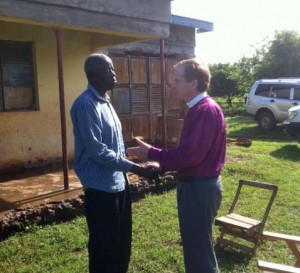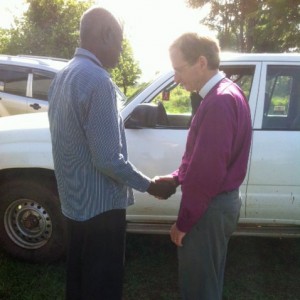The post-colonial period in Uganda through the 1960s was troubled but relatively functional. With the ascent of Idi Amin in 1971, however, the country spiraled into a prolonged period of violence. Within seven years, the careful infrastructure left behind by the British had been destroyed, dismantled or sold. Inter-tribal rivalries, carefully regulated by the colonial powers to enhance their own security, boiled over in unpredictable and uncontrollable ways. For the next 35 years, the peoples of Uganda were set against each other and tore each other to pieces. It was madness on a scale of millions. Children were made to kill their parents and then trained to view their new commanders as their true fathers. Twelve-year-olds committed atrocities against whole villages. Wild tribes from Karamoja rustled cattle and murdered the herders, sometimes with government help. Whole families were slaughtered for rebels to gain a bicycle or a chicken. Hundreds of thousands fled to camps where they often died just as quickly as they would have at home.
Papa Ilukor was the Bishop of Soroti during most of this turbulent period. He has a first name, but nobody ever uses it. He is simply Papa. Nearly alone, he had the integrity and courage to hold together the people of Teso even as the rest of the country was falling apart at the seams. He is sometimes called the Mandela of the North. More than once, he simply walked into rebel encampments and persuaded them to put down their arms. He convened talks between parties who had vowed to kill each other. He brought about reconciliation where there was simply no possibility of it. He flew abroad and presented the crisis in Uganda to a world that didn’t want to hear about it, and he returned, miraculously, with planeloads of food, blankets and medical supplies. He saved the lives of thousands.
When Pilgrim began, an upstart organization led by “these young men” (a term of contempt from the local elders), Papa Bishop was a game-changing ally. He saw the vision, and quietly stood up for us every chance he got. Five years ago, he presided over a regional development conference that gave us a huge step forward in establishing Pilgrim’s stature in the community.
On the way down to Kampala from Soroti, I want to pay my respects. We’re pressed for time. We have been summoned for a meeting with the Minister of Health in the afternoon, so we were on the road by 6:30 a.m., a day earlier than scheduled. At some point before Mbale, we turn off the main road and head up a series of tracks through the outlying hamlets of Bukedea, in search of Papa.
After many false turns, shy and inadequate directions, and swampy conditions I thought would sink us, Francis guides our 4×4 to the house. The bishop has just returned from his garden and (his wife shouts this from within) will not receive us until he puts on trousers and a clean shirt. After a few minutes he emerges, and greets us graciously.
He really is larger than life. It isn’t just that he is very tall. He radiates a kind of confident energy that is humble at the same time. His face is full of laugh lines, but at rest, looks a little sad. His hands are huge farmer’s hands, and when he takes my hand, he refuses to let it go.
His English is elegant and sonorous. He is immediately concerned about my schedule. I don’t have to explain myself. He knows all about Pilgrim and he remembers me from the conference years before, though he notes the purple shirt is a change. I stammer my thanks for his support and encouragement over the years, and on our way to the car, he admits it was tough in the beginning. But, he expresses the hope that the elders have finally gotten over their initial opposition and now recognize that the future belongs to “these young men.” At the car door, still holding my hand, Papa Ilukor prays a blessing over me. It is like being ordained all over again.


